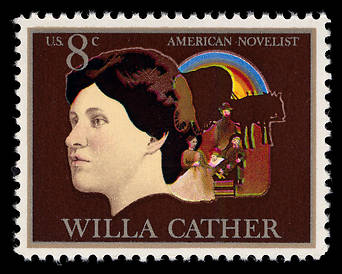Willa Gather (1876-1947)
Willa Sibert Cather was born at Winchester, Va., in 1876. She was for some years engaged in newspaper work, and was until 1912 associate editor of McClures Magazine. Her novels, My Antonia and A Lost Lady, are among the best modern American fiction. In Jier volume Touth and the Bright Medusa she offers a variety of well-written short stories. Miss Cather described with honesty and power the characters and scenes she knew and understood.
A Wagner Matinee is reprinted from Youth and the Bright Medusa. Copyright, 1920, by Alfred A. Knopf, New York, and William Heinemann, London, by whose permission it is here used.
A Wagner Matinee
I received one morning a letter, written in pale ink on glossy blue-lined note-paper, and bearing the postmark of a little Nebraska village. This communication, worn and rubbed, looking as if it had been carried for some days in a coat pocket that was none too clean, was from my Uncle Howard, and informed me that his wife had been left a small legacy by a bachelor relative, and that it would be necessary for her to go to Boston to attend the settling of the estate. He requested me to meet her at the station and render her whatever services might be necessary. On examining the date indicated as that of her arrival, I found it to be no later than to-morrow. He had characteristically delayed writing until, had I been away from home for a day, I must have missed my aunt altogether.
The name of my Aunt Georgiana opened before me a gulf of recollection so wide and deep that, as the letter dropped from my hand, I felt suddenly a stranger to all the present conditions of my existence, wholly ill at ease and out of place amid the familiar surroundings of my study. I became, in short, the gangling farm-boy my aunt had known, scourged with chilblains and bashfulness, my hands cracked and sore from the corn husking. I sat again before her parlor organ fumbling the scales with my stiff red fingers, while she, beside me, made canvas mittens for the huskers.
The next morning, after preparing my landlady for a visitor, I set out for the station. When the train arrived. I had some difficulty in finding my aunt. She was the last of the passengers to alight, and it was not until I got her into the carriage that she seeemed really to recognize me. She had come all the way in a day coach; her linen duster had become black with soot and her black bonnet gray with dust during the journey. When we arrived at my boarding house the landlady put her to bed at once and I did not see her again until the next morning.
Read More about Cavalleria Rusticana part 6








